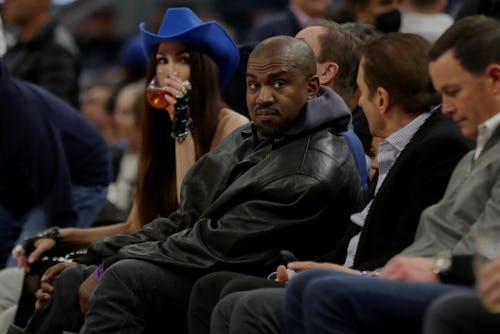The Grammys canceling Kanye's performance is just glorified self-preservation
The Recording Academy couldn’t afford to risk a Kanye performance.

Right now, at this very moment, Kanye West’s Instagram page is a ghost town — empty of posts, his icon a blank black circle. It’s largely predictable considering his tendency over the last few months: spam-post everything and everyone he takes issue with in the wake of his split from his estranged wife Kim Kardashian, let it spread, and delete the evidence. But it’s striking that he has remained silent after his 24-hour Instagram ban from last week ran up, and especially in the wake of this weekend’s news that the Grammys were rescinding their invitation to him to perform at this year’s ceremony due specifically to his “concerning online behavior” as of late.
It’s hard to say whether the quiet on his end at this moment — which may have completely erupted into a storm by the time you read these words — is just the downswing of his typical pattern before another deluge of posts, or if it’s a genuine and strategic reaction to the news. West has always had a tumultuous relationship with the Grammys, but might he actually be pleading his case by in fact correcting the online behavior in question? That is perhaps wishful thinking when it comes to Kanye.
West has long been a singular reminder of the bogeyman nature of cancel culture — someone who ruffles more feathers than perhaps any other living celebrity, but nevertheless remains top of mind in the zeitgeist. But the move by the Grammys is arguably the first time he’s ever had a legitimate repercussion to his chaotic ways. And as much as it has become a refrain to practically the entire career of Kanye West, we may truly be at a breaking point in our patience with him amid this latest string of antics, a public campaign of harassment and emotional abuse. After all, it’s now hard to even choose to separate the artist from the art, considering that one would need to shell out $200 just to access the art and listen to the string of unpolished skeleton tracks that is his latest album.
The Grammys’ decision is by no means some remarkable ethical stand: people who have done far worse things have been invited onto the Grammys stage throughout the years. But the Recording Academy has to draw the line with Kanye in particular due to his sheer unpredictability when it comes to having a mic in his hand on music’s biggest night, not to mention the fact that his dust-up online that resulted in his one-day Instagram ban was with this year’s Grammys host Trevor Noah. The decision is simply a preemptive damage control measure (and also telling that in the calculus for the Grammys, which has struggled to fight for their waning relevance, his chaos outweighed the viewership and publicity that a Kanye stunt would have naturally gifted them). Yet it also happens to be the right institutional move for Kanye’s own sake.
There is a subtext to jeen-yuhs, Netflix’s recent, fascinating three-part documentary that mostly tracks his early rise, that Kanye has truly been warped and trapped by his gargantuan fame. Even if one might sense a version of the same old Kanye throughout, it’s nearly impossible to miss a jarring and often frightening shift between his grounded, if still haughty, younger self and the often troubled contemporary version of him that refuses to, in his eyes, be tamed. His mental health issues are trapped in a negative feedback loop: he lets loose his most uncensored self on big stages, the public consumes and feeds off of his behavior (even when it might react out of genuine concern), and his spotlight reignites and ultimately exacerbates his desire to do more of the same rather than signal to himself his need for help. Barring him from the Grammys stage, in a sense, is cutting off a fuel source to that cycle.
It is unlikely that Kanye would have performed a simple set at the show, and it’s a neutral good to not provide a platform to a troubled bully. In turn, the dramatic move can be seen as a way to push Ye to consider the limits of the public’s interest in him and his tantrums, or its willingness to excuse his actions over his mental health struggles. Even as they get worse, the Kanye tantrums are starting to blend, and it’s reasonable to wonder if our most controversial star can even bother us anymore with controversy.
This whole thing, though, is unfortunately likely to only further entrench his behavior. He, like many others who rail against cancel culture, has a built-in system of confirmation bias: for Kanye, it’s all likely just another example of how people want to silence a star who is freethinking. West’s philosophy on his stardom has always been explosive: “Everybody gon’ say somethin’ / I’d be worried if they said nothin’,” he once rapped. It’s high time he started reconsidering his strategy before everyone really does stop caring.